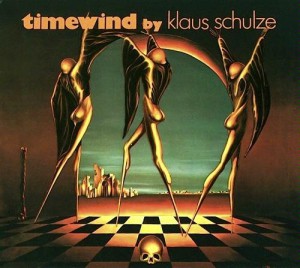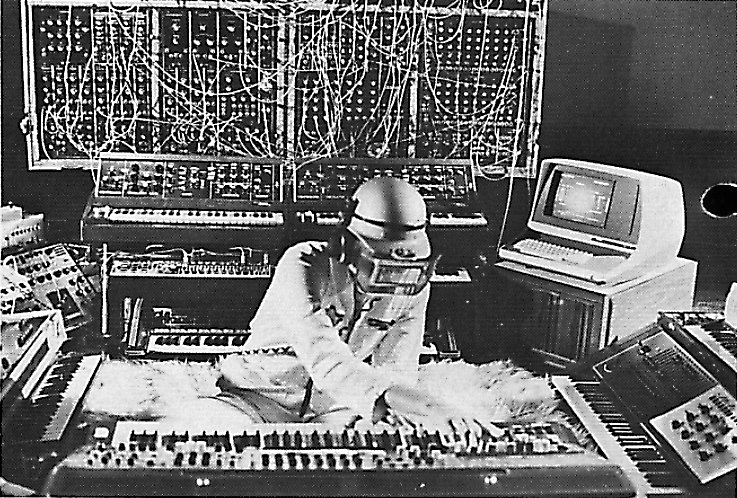Klaus Schulze-The 7th Icon of Echoes: An Appreciation
by John Diliberto Updated 1/26/2021
Three years ago we celebrated the 70th birthday of Klaus Schulze and I wrote this at that time. Now, as we celebrate his anointment as the 7th of 30 Icons of Echoes, I’m taking another look back at this giant of electronic music.
To those of us who came up listening to electronic music in the 1970s, Klaus Schulze was an icon. The German musician tapped directly into the growing electronic gestalt and created the template of electronic music that many, to this day, are employing. His name has faded in recent decades, but back in the day, he was cited right alongside of Tangerine Dream, Kraftwerk and Can. He turns 70 on August 4th.
I remember the first time I heard Klaus Schulze. A friend of a friend, Dan Kelly, brought in an import copy of Picture Music to WXPN while I was on the air. I put it on and heard a new world of sound. This would’ve been 1975 and it was a life changing moment. Schulze already had three other albums out, Irrlicht, Cyborg and Blackdance. He had also founded the group Ash Ra Tempel and was the drummer on the very first Tangerine Dream album, Electronic Meditation. I remember the phone lines lit solid for all 25 minutes of “Mindphaser” when I played the Moondawn album on WXPN’s Diaspar show in 1976. We only use his first name, the way you just call Miles Davis, Miles. In my world, everyone knows who you meant. Klaus has released hundreds of albums, most of them with compositions that last over 30 minutes. Along with Tangerine Dream, he forged the sequencer sound that is still in use today.
 Klaus Schulze was part of the original genesis of Echoes. The albums he recorded in the 1970s and early 80s reside at the core of music experiences for myself and the central Echoes staff. Albums like Moondawn, Timewind and X, and many more provided the soundtrack for many an imaginary movie during those years. There was something about the pulsing sequencers, free form, note bending Moog solos, and spiraling, Escher-like architecture that spoke of a world outside of conventional rock or classical music. I remember synthesist Mark Shreeve of Redshift describing Mirage as if it had “formed out of thin air, untouched by human hands.” Klaus’s music had that transcendental power, as if it came from somewhere beyond this plane of existence.
Klaus Schulze was part of the original genesis of Echoes. The albums he recorded in the 1970s and early 80s reside at the core of music experiences for myself and the central Echoes staff. Albums like Moondawn, Timewind and X, and many more provided the soundtrack for many an imaginary movie during those years. There was something about the pulsing sequencers, free form, note bending Moog solos, and spiraling, Escher-like architecture that spoke of a world outside of conventional rock or classical music. I remember synthesist Mark Shreeve of Redshift describing Mirage as if it had “formed out of thin air, untouched by human hands.” Klaus’s music had that transcendental power, as if it came from somewhere beyond this plane of existence.
Of course, Klaus was very much human, a garrulous guy with a corny sense of humor full of bad puns and capable of making human mistakes. In the 1980s, as psychedelics gave way to cocaine, Klaus became addicted and it affected his music badly and even he admitted that alcohol and drugs made his music heavier and more turgid. Many of us began drifting away even as Schulze began churning out more and more music. There was the archival 10 CD Silver Edition in 1993, followed by the 10 CD Historic Edition in 1995 and the 25-disc box, Jubilee Edition. Schulze seemed intent on releasing every squiggle, bleep and fart he’d ever committed to disc. To his credit, he also continued to explore with form and technology, heading into experimental directions while his contemporaries desperately tried to sell out. But many of those experiments failed to spark the same interest as his early, groundbreaking works. Many of us became inured to his music and subsequent box sets and albums have gone unnoted by many formerly stalwart fans. That’s why you haven’t heard Klaus as much on Echoes as you have his acolytes like Steve Roach, Mark Shreeve, Robert Rich and Ian Boddy. That, and the fact that he still insists on creating opuses of 20, 30 and more minutes that just don’t work on the radio. But it should be said that Klaus Schulze is not composing music with radio airplay in mind.
Over the last decade I’ve found myself returning to Klaus Schulze like a parishioner who has left the flock. Most of his catalog was re-released, much of it for the first time ever in the U.S., in deluxe, nicely packaged editions. Despite failing to remaster the material for contemporary audio standards, Klaus’s music still holds up and the mystery and spectacle of Moondawn, Picture Music and Audentity still remains.
Klaus has reportedly been in ill health in recent years. After a spate of work that found him in fruitful collaborations with singer Lisa Gerrard of Dead Can Dance on Farscape in 2009 and Come Quietly in 2009 and releasing the masterful Shadowlands in 2013, the prolific artist has been quiet. But in 2018 he released Silhouettes, a beautiful, minimalist work of surprising lyricism.
It is difficult to imagine the various forms of techno and EDM without Klaus Schulze. He was the original Trance artist. His influence is not only heard in the obvious places like Steve Roach, Robert Rich and Ian Boddy, but it turns up in pop, ambient chamber music and just plain ambient music. Moby cites him as an influence and you wouldn’t have the soundtracks to Mr. Robot and Stranger Things without him. Those composers all know they are indebted to him.
More importantly than that has been Klaus Schulze’s music in my life. How deep is it? I remember at the height of nuclear fear in the 1980s having a dream that the bombs were coming and we were all going to die. Sitting with my stereo and records, my friends and I took this moment of doom to decide what was the last record we would hear. We decided on Klaus Schulze’s Mirage. I stand by that choice today. Klaus Schulze took me to new worlds. He made the good times an ecstatic trip, he gave me hope in the bad times. Sitting with headphones on amidst the spinning cycles and arcing melodic improvisations, Klaus Schulze created new worlds.
With his hundreds of albums and collections, it’s difficult to know where to start with the Klaus discography. But here’s the albums that I think reveal the brilliance of Klaus Schulze.
FIVE ESSENTIAL KLAUS SCHULZE CDs
X
Mirage
Trancefer
Timewind
Body Love


“In the 1980s, as psychedelics gave way to cocaine, Klaus became addicted and it affected his music badly and even he admitted that alcohol and drugs made his music heavier and more turgid. ”
Dear John.
Addicted to Alcohol: yes, and sadly enough. (Plus coffee and too much nicotine).
But “cocaine” and similar “and drugs”? This is an invention (or error, or hearsay, or guess) by the writer of the story.
Even marihuana was a thing of the past younger years, in the sixties.
I was present from 1973 on.
Nice to hear from you KDM. But here’s the story in Klaus’ own words to me:
I was taking a lot [of cocaine], but it wasn’t a problem and
I stopped myself. I mean I took enough. There was a rotten
time. It was also a stress problem. You drink because of
depression and you drink because of stress. The problem was
you woke up in the morning and because of the sleeping pills
you were sleepy, then you take the first line and you’re on.
You drink something and then the concert came and you took
another lines, not one, some more, with Rainier, we both did
that. Then you were really on and you wated to sleep and you
took a pill to sleep and there’s a stupid circle. When I came
back from the tour i didn’t take the pills, the cocaine. I
never felt addicted to cocaine. I used it sometimes in the
studio when I had to much work and the musicians were there
and and I was tired. It’s a working drug, it’s not for
pleasure. But it takes a lot out of the body and I went to
a clinic in Spain and stopped the cocaine, but I couldn’t
stop the drinking.
You can parse whether it was “addiction” or not, but he went to a clinic in Spain to stop the cocaine, so, I’d say that was an addiction.
I always appreciate your fact-checking, but be sure before you accuse a writer, me, of “invention (or error, or hearsay, or guess”.
Thanks John, it’s amazing how “KS” is seen from the US, seems great but not really what the man represents in Europe.
I was bon in the Netherlands but live in France since +40 years, the influence of Klaus in this country is historically important although his music isn’t for any kid of approach you have to sit quietly with headphones and listen and re-interpretate the music .. I have been listening hundreds of times the Albums like -Timewind – Moondawn – Mirage – Dune or -X- and nowadays +40 years later I still do and I still discover profound sounds I was unaware of before!
Thank’s to Klaus this has changed my life and I’m still anxiously seeking for his next Album.
Thanks Eric. I agree that Klaus is much bigger in Europe and probably east Asia, than North America. But then, he’s never toured in the US and has made very little effort at publicity in here, so that has certainly hindered his profile here. I often feel like the lone voice in the wilderness for Klaus.
Never saw Klause live but have seen Tangerine Dream. When they flip on the sound and that thump of the speakers goes thru your body! Yeah, it was great, real pure electric great!
I have listened to KS daily for the last 4 years and still run into music I have never heard before by him. I feel Timewind is the perfect beginner album for his music. And X or “Ten.” Mirage I find a great escape in the Winter time with, but mos of the year I find it to be a bit too. somber. And reading what inspired the album I can understand why. There are some of his albums I have read zero about which I like even better like the Royal Festival Hall concerts, Dosburg Online, Beyond Recall, and Audentity. I feel his late 80’s to 90’s material is the most overlooked and contains many of my favorite moments. Love all his work. And I thank you for sharing him to us. I would not have found out about him as soon as I did if not for Echoes.
Thanks. I’ve been rediscovering that middle period myself as well.